Related Research Articles

Barry Morris Goldwater was an American politician and major general in the Air Force Reserve who served as a United States senator from 1953 to 1965 and 1969 to 1987, and was the Republican Party's nominee for president in 1964.

The 1964 United States presidential election was the 45th quadrennial presidential election. It was held on Tuesday, November 3, 1964. Incumbent Democratic President Lyndon B. Johnson defeated Republican Senator Barry Goldwater in a landslide victory. Johnson was the fourth and most recent vice president to succeed the presidency following the death of his predecessor and win a full term in his own right. Johnson won the largest share of the popular vote for the Democratic Party in history at 61.1%. As of 2024, this remains the highest popular vote percentage of any candidate since the advent of widespread popular elections in 1824.

Nachem Malech Mailer, known by his pen name Norman Kingsley Mailer, was an American writer and filmmaker. In a career spanning more than six decades, Mailer had 11 best-selling books, at least one in each of the seven decades after World War II.
New Journalism is a style of news writing and journalism, developed in the 1960s and 1970s, that uses literary techniques unconventional at the time. It is characterized by a subjective perspective, a literary style reminiscent of long-form non-fiction. Using extensive imagery, reporters interpolate subjective language within facts whilst immersing themselves in the stories as they reported and wrote them. In traditional journalism, the journalist is "invisible"; facts are meant to be reported objectively.
The Armies of the Night: History as a Novel/The Novel as History is a nonfiction novel recounting the October 1967 March on the Pentagon written by Norman Mailer and published by New American Library in 1968. It won the Pulitzer Prize for General Nonfiction and the National Book Award in category Arts and Letters. Mailer's unique rendition of the nonfiction novel was perhaps his most successful example of new journalism, and received the most critical attention. The book originated as an essay published in Harper's Magazine titled "The Steps of the Pentagon," at the time the longest magazine article ever published, surpassing John Hersey's "Hiroshima" in The New Yorker.
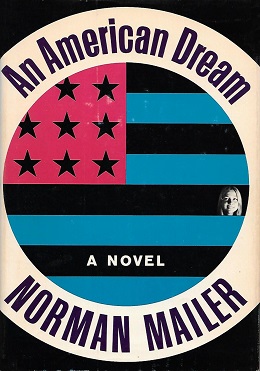
An American Dream is a 1965 novel by American author Norman Mailer. It was published by Dial Press. Mailer wrote it in serialized form for Esquire, consciously attempting to resurrect the methodology used by Charles Dickens and other earlier novelists, with Mailer writing each chapter against monthly deadlines. The book is written in a poetic style heavy with metaphor that creates unique and hypnotising narrative and dialogue. The novel's action takes place over 32 hours in the life of its protagonist Stephen Rojack. Rojack is a decorated war-hero, former congressman, talk-show host, and university professor. He is depicted as the metaphorical embodiment of the American Dream.
Dwight Macdonald was an American writer, critic, philosopher, and activist. Macdonald was a member of the New York Intellectuals and editor of their leftist magazine Partisan Review for six years. He also contributed to other New York publications including Time, The New Yorker, The New York Review of Books, and Politics, a journal which he founded in 1944.
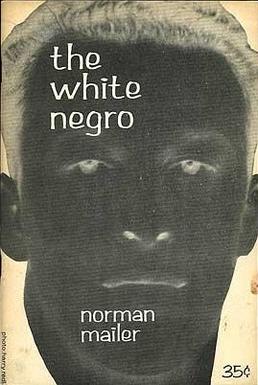
The White Negro: Superficial Reflections on the Hipster is a 9,000-word essay by Norman Mailer that connects the "psychic havoc" wrought by the Holocaust and atomic bomb to the aftermath of slavery in America in the figuration of the Hipster, or the "white negro". The essay is a call to abandon Eisenhower liberalism and a numbing culture of conformity and psychoanalysis in favor of the rebelliousness, personal violence and emancipating sexuality that Mailer associates with marginalized black culture. The White Negro was first published in the 1957 special issue of Dissent, before being published separately by City Lights. Mailer's essay was controversial upon its release and received a mixed reception, winning praise, for example, from Eldridge Cleaver and criticism from James Baldwin, Ralph Ellison, and Allen Ginsberg. Baldwin, in particular, heavily criticized the work, asserting that it perpetuated the notorious "myth of the sexuality of Negros" and stating that it was beneath Mailer's talents. The work remains his most famous and most reprinted essay and it established Mailer's reputation as a "philosopher of hip".
Noel Edward Parmentel Jr. was an American writer who was a leading figure on the New York political journalism, literary, and cultural scene during the 20th century. He was known for criticizing political figures on the left and right that he considered "phonies". He was credited with introducing a much-quoted question about Richard Nixon: "Would you buy a used car from this man?" He wrote for publications such as The Nation, National Review and Esquire. Parmentel mentored writers such as John Gregory Dunne and Joan Didion. He collaborated on films with Norman Mailer and Richard Leacock and advised Mailer to run for mayor of New York City in 1969.

Why Are We In Vietnam? (WWVN) is a 1967 novel by the American author Norman Mailer. It focuses on a hunting trip to the Brooks Range in Alaska where a young man is brought by his father, a wealthy businessman who works for a company that makes cigarette filters and is obsessed with killing a grizzly bear. As the novel progresses, the protagonist is increasingly disillusioned that his father resorts to hunting tactics that seem dishonest and weak, including the use of a helicopter and taking credit for killing a bear. At the end of the novel, the protagonist tells the reader that he is soon going to serve in the Vietnam War as a soldier.

Miami and the Siege of Chicago: An Informal History of the Republican and Democratic Conventions of 1968 is a non-fiction novel written by Norman Mailer which covers the Republican and Democratic national party political conventions of 1968 and the anti-Vietnam War protests surrounding them. It was published in 1968 by the World Publishing Company.
Frederick Clifton White Sr. was an American political consultant and campaign manager for candidates of the Republican Party, the New York Conservative Party, and some foreign clients. He was a moving force behind the Draft Goldwater Committee from 1961 to 1964, which secured a majority of delegates to nominate U.S. Senator Barry M. Goldwater of Arizona as the Republican Party presidential candidate in the 1964 presidential election.
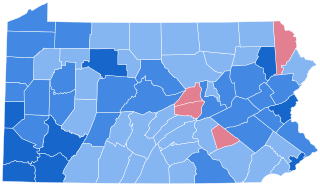
The 1964 United States presidential election in Pennsylvania took place on November 3, 1964, and was part of the 1964 United States presidential election. Voters chose 29 representatives to the Electoral College, who voted for president and vice president. Pennsylvania overwhelmingly voted for the Democratic nominee, President Lyndon B. Johnson, over the Republican nominee, Senator Barry Goldwater. Johnson won Pennsylvania by a margin of 30.22%. Apart from William Howard Taft in 1912, Goldwater's 34.7% of the vote is easily the worst showing for a Republican in the state since the party was founded. Even relative to Johnson's popular vote landslide, Pennsylvania came out as 7.64% more Democratic than the nation at-large; the only occasion under the current two-party system that the state has been more anomalously Democratic than this was in Ronald Reagan's 1984 landslide.
Bob Gomel is an American photojournalist who created images of 1960s world leaders, athletes, entertainers, and major events. His photographs have appeared on the covers of Life, Sports Illustrated, Newsweek, Fortune, and Forbes, and in Time, The New York Times, and Stern, and in more than 40 books. Gomel's images are held in the collections of the U.S. Library of Congress and the Museum of Fine Arts in Houston.

"Superman Comes to the Supermarket" is an essay by the American novelist and journalist Norman Mailer about the 1960 Democratic convention. Originally published in Esquire as "Superman Comes to the Supermart," this essay was Mailer's initial foray into political journalism. It characterizes John F. Kennedy as a potential "existential hero" who could revitalize the US after eight years under Dwight D. Eisenhower to rediscover its lost imagination. "Superman" further develops and emphasizes Mailer's concern with the importance of the individual's will and creativity that must challenge conformity and obedience in American life to fully realize a genuine life. With "Superman", Mailer extends New Journalism by taking an active role in the narrative, which would characterize much of his subsequent journalistic style and lead to his Pulitzer Prize for The Armies of the Night in 1968.

The Short Fiction of Norman Mailer is a 1967 anthology of short stories by Norman Mailer. It is grouped into eight thematic sections and contains nineteen stories, many appearing in one of Mailer's miscellanies; thirteen were published in periodicals or other anthologies before appearing in this collection. The collection was reprinted in hardcover in 1980 and some of the stories were reprinted in other volumes.
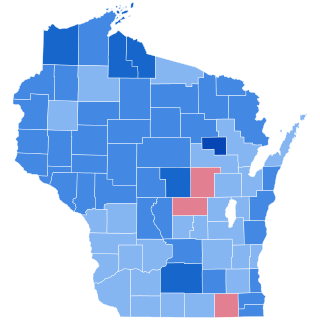
The 1964 United States presidential election in Wisconsin was held on November 3, 1964, as part of 1964 United States presidential election. State voters chose 12 electors to the Electoral College, who voted for president and vice president.

"The Man Who Studied Yoga", a novella by Norman Mailer written in 1952, was first published in the 1956 collection New Short Novels 2 then later in Mailer's 1959 miscellany Advertisements for Myself (AFM). It is a tale of a "writer manqué", or a writer who fails to write, reflecting some of Mailer's own anxiety in the 1950s as he tries to reinvent himself.

This Norman Mailer bibliography lists major books by and about Mailer, an American novelist, new journalist, essayist, public intellectual, filmmaker, and biographer. Over a fifty-nine-year period, Mailer won two Pulitzer Prizes and had eleven books spend a total of 160 weeks on the New York Times bestseller list. Mailer's output included fiction, non-fiction, poems and essays. Biographer J. Michael Lennon called Mailer the chronicler of the American Century, and a talent whose career has "been at once so brilliant, varied, controversial, improvisational, public, productive, lengthy and misunderstood".
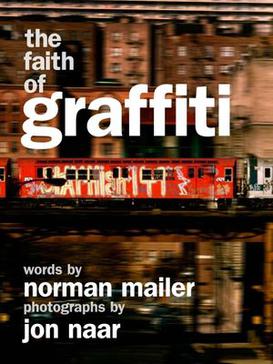
The Faith of Graffiti is a 1974 essay by American novelist and journalist Norman Mailer about New York City's graffiti artists. Mailer's essay appeared in a shorter form in Esquire and as a book with 81 photographs by Jon Naar and design by Mervyn Kurlansky. Through interviews, exploration, and analyses, the essay explores the political and artistic implications of graffiti. The essay was controversial at the time of publication because of its attempt to validate graffiti as an art form by linking it with great artists of the past. Some critics also said Mailer was using the essay as a platform to express his political grievances. Faith grew out of Mailer's existential philosophy of the hip, in which a Hipster is guided by his instincts regardless of consequences or perception, and upholds graffiti as a subversive and healthy check on the status quo. Like several of his other non-fiction narratives, Mailer continued his use of new journalism techniques, adopting a persona, the A-I or "Aesthetic Investigator", to provide both an objective distance from the topic and to engender the text with the creative and critical eye of the novelist.
References
Citations
- 1 2 3 4 5 Lennon 2013, p. 343.
- 1 2 Mills 1982, p. 289.
- ↑ Mailer 1976, p. 6.
- ↑ Mailer 1967, p. 13.
- 1 2 Mailer 1967, p. 27.
- ↑ Mailer 1967, p. 28.
- ↑ Mailer 1967, p. 37.
- ↑ Mailer 1967, p. 41.
- ↑ Mailer 1967, p. 42.
- 1 2 Mailer 1967, p. 43.
- 1 2 Mailer 1967, p. 45.
- ↑ Merrill 1978, pp. 101–102.
- ↑ Ross 2016, p. 57.
- ↑ Merrill 1978, p. 102.
- 1 2 Glenday 2013, p. 381.
- ↑ Dearborn 1999, pp. 209–210.
- ↑ Begiebing 2017, p. 258.
- ↑ Lennon & Lennon 2018, p. 61.
- ↑ Lennon & Lennon 2018, p. 65.
Works cited
- Begiebing, Robert (2017). "Where is Norman Mailer When We Need Him?". The Mailer Review. 11 (1): 255–264.
- Dearborn, Mary V. (1999). Mailer: A Biography . Boston: Houghton Mifflin. ISBN 0-395-73655-2.
- Glenday, Michael K. (2013). "The Currents and the Oceans of Fame". The Mailer Review. 7 (1): 377–383.
- Lennon, J. Michael (2013). Norman Mailer: A Double Life. New York: Simon and Schuster. ISBN 978-1439150214.
- —; Lennon, Donna Pedro (2018). Lucas, Gerald R. (ed.). Norman Mailer: Works and Days (Revised and Expanded ed.). Atlanta: Norman Mailer Society. ISBN 9781732651906. Archived from the original on 2018-11-22. Retrieved 2021-02-14.
- Mailer, Norman (1967). "In the Red Light: A History of the Republican Convention in 1964". Cannibals and Christians. New York: Dial. pp. 6–45.
- — (1976). "Superman Comes to the Supermarket". Some Honorable Men: Political Conventions, 1960-1972. Boston: Little, Brown. pp. 1–46. ISBN 978-0-316-54415-3. OCLC 1036869622.
- Merrill, Robert (1978). Norman Mailer . Boston: Twayne.
- Mills, Hilary (1982). Mailer: A Biography . New York: McGraw-Hill. ISBN 0-88015-002-5.
- Ross, William T. (2016). "When Novelists Were Kings: Norman Mailer and Esquire in the 1960s". The Mailer Review. 10 (1): 48–66.
Bibliography
- Adamowski, T. H. (2006). "Demoralizing Liberalism: Lionel Trilling, Leslie Fiedler, and Norman Mailer". University of Toronto Quarterly. 75 (3): 883–904. doi:10.3138/utq.75.3.883.
- Joscelyne, Sophie (September 4, 2020). "Norman Mailer and American Totalitarianism in the 1960s" . Modern Intellectual History. 19: 241–267. doi:10.1017/S1479244320000323. S2CID 225330008.
- Kaufman, Donald L. (2008). "Norman Mailer in God's Attic". The Mailer Review. 2 (1): 298–312. Retrieved 2021-02-15.
- Mailer, Norman (November 1964). "In the Red Light: A History of the Republican Convention in 1964" . Esquire. pp. 83–89, 167–172, 174–177, 179. Retrieved 2021-02-14.
- — (2018). "In the Red Light". In Lennon, J. Michael (ed.). Norman Mailer: Collected Essays of the 1960s. New York: Library of America. pp. 232–280.
- — (1978). "In the Red Light: A History of the Republican Convention in 1964". Some Honorable Men: Political Conventions, 1960-1972. Boston: Little, Brown. pp. 47–94.
- — (June 1964). "Norman Mailer on LBJ". The Realist. No. 60. pp. 1, 10–15. Retrieved 2021-02-15. Partial reprint of "Red Light".
- Merrill, Robert (1978a). "After Armies: Norman Mailer's Recent Nonfiction" . Centennial Review. 22 (4): 445–466. JSTOR 23738972 . Retrieved 2021-02-15.
- — (1974). "Norman Mailer's Early Nonfiction: The Art of Self-Revelation" . Western Humanities Review. 28 (1): 1+. Retrieved 2021-02-15.
- Piazza, Tom (2008). "Citizen Mailer: In His Finest Work, Norman Mailer Applied Subjective Journalism to the Powerful and to Himself". Columbia Journalism Review. 47 (4): 51+. Retrieved 2021-02-15.
- Zirakzadeh, Cyrus Earnesto (2007). "Political Prophecy in Contemporary American Literature: The Left Conservative Vision of Norman Mailer" . The Review of Politics. 69 (4): 625–649. doi:10.1017/S0034670507000988. S2CID 143821180 . Retrieved 2021-02-15.